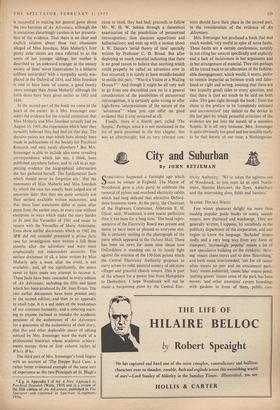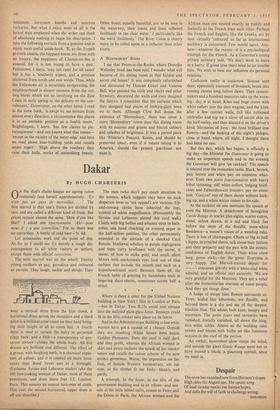City and Suburban
By JOHN BETJEMAN SOMETHING happened a fortnight ago which must be unique in England. The Mayor of Woodstock gave a civic party to celebrate the removal.of pylons and overhead electricity cables which had long defaced that attractive Oxford- shire limestone town. At the party, the Chairman of the Highways Committee, Alderman E. H. Oliver, said, 'Woodstock is now nearer perfection than it has been for a long time.' The local repre- sentative of the Electricity Board was present and seems to have been as pleased as everyone else. He is certainly smiling in the photograph of the party which appeared in the Oxford Mail. There has been no news for some time about how Oxfordshire is standing out in its lonely fight against the erection of the 130-foot pylons which the Central Electricity Authority proposes to carry across its mild, pastoral scenery of old stone villages and graceful church towers. This is part of the scheme for a power line from Hampshire to Derbyshire. I hope Woodstock will not be made a bargaining point by the Central Elec- tricity Authority : 'We've taken the ugliness out of Woodstock, so you must let us, spoil North- moor, Stanton Harcourt, the Tews, Adderbury and the intervening elms, fields and hamlets.'
SEASIDE DOUBLE-WRITE Few winter pleasures delight me more than reading popular guide books to sunny seaside resorts, now shuttered and windswept. They are generally written, I suppose, by somebody in the publicity department of the corporation, and one begins to know the language. 'Secluded' means stuffy and a very long way from any form of transport; 'increasingly popular' means a lot of new speculative building on the outskirts; 'thriv- ing' means chain stores and so does 'flourishing,' and both mean overcrowded; 'not for all tastes' often means no pier and no amusement park; 'busy' means induStrial; 'canoe lake' means pond; 'putting greens' means some of the park has been mown; 'and other amenities' covers hoardings with gardens in front of them, public con-
veniences, ice-cream booths and concrete rockeries. But what I enjoy most of all is the lyrical style employed when the writer can think of absolutely nothing to begin his description. I take the following extracts from a genuine and in many ways useful guide-book. 'If, as the French proverb asserts, the happiest towns are those with no history, the happiness of Clacton-on-Sea is assured, for it is too young to have a past.' Felixstowe, I learn, 'may not cater for all tastes' but it has a 'southerly aspect, and a position sheltered from north and east winds. Thus, while the Felixstowe air is invariably invigorating, the neighbourhood is almost immune from the cut- ting blasts which are so terrifying on the East Coast in early spring to the delicate or the con- valescent.' Dovercourt, on the other hand, I read in the same book, 'is swept by sea-breezes from almost every direction, a circumstance that places it in an enviable position as a health resort.' Brightlingsea, I learn, 'has few claims to pic- turesqueness'—and one knows what that means— 'except in the vicinity of the water-edge' and here we read about boat-building yards and vessels under repair : 'High above the roadway they raise their hulls, works of astonishing beauty. Other boats, equally beautiful, are to be seen in the waterway, their masts and lines reflected faultlessly in the clear water.' I particularly like the word 'faultlessly.' The River Colne is clearly more to be relied upon as a reflector than other rivers.
A 'BLOOMSBURY' ROOM
I see that Penns-in-the-Rocks, where Dorothy Wellesley lived, has been sold. I wonder what will become of the dining room in that hidden and secret old house? It was completely refurnished and decorated by Duncan Grant and Vanessa Bell, who painted the table and chairs and other furniture, decorated the walls and even designed the fabrics. I remember that the curtains which they designed had pieces of looking-glass sewn on to them. Although Clive Bell denies the existence of 'Bloomsbury,' there was never a more 'Bloomsbury' room than this dining room with its mauves and greens and biscuit colours and splashes of brightness. It was a period piece like Whistler's Peacock Room, and should be preserved intact, even if it means taking it to America, should the present purchaser not want it.



































 Previous page
Previous page